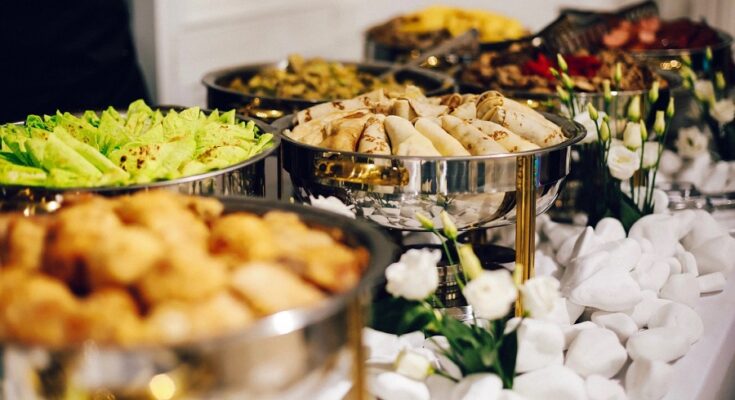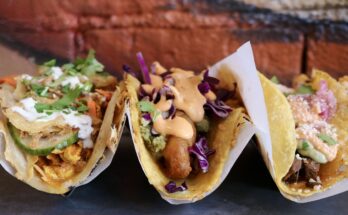Choosing the Perfect Catering Style for Your Event
Understanding Different Catering Types: Buffet vs. Plated Service
When it comes to selecting a catering style for your event, understanding the differences between buffet and plated service is essential. Buffet-style catering offers a more relaxed atmosphere, allowing guests to serve themselves from a diverse selection of dishes. This format not only promotes mingling and conversation among attendees but also caters to varying tastes and dietary needs, as guests can choose what they would like to eat and how much. However, a buffet requires thoughtful planning regarding the layout and flow to prevent congestion and ensure a pleasant dining experience. It calls for an attractive display, with aesthetic considerations that can contribute to the event’s overall ambiance.
On the other hand, plated service offers a more formal dining experience. Guests are served individual portions directly at their tables, which elevates the sophistication of your event. Plated meals can be particularly beneficial for events where time is constrained, such as corporate luncheons or formal wedding receptions. This style allows for better portion control and can simplify the overall dining experience by reducing the potential for long lines. However, it typically requires more coordination for the catering staff, as they must be mindful of timing and serve each course promptly to maintain temperature and quality.
Ultimately, the choice between buffet and plated service should depend on the nature of your event, your guest list, and the atmosphere you wish to create. Many modern events also incorporate hybrid styles that combine elements of both, granting versatility to the dining experience. Consider conducting surveys or gathering information from potential guests to determine which style might best suit their preferences and comfort.
Exploring Specialty Caterers: Food Trucks, Pop-Ups, and More
As societal dining preferences evolve, many event planners are turning to specialty event catering services that offer a unique twist on traditional catering. Food trucks have surged in popularity, providing a fun and informal dining experience. Perfect for outdoor events or casual gatherings, food trucks bring culinary diversity right to your doorstep, serving everything from gourmet tacos and artisanal burgers to vegan delights and dessert creations. They not only add a trendy flair to your event, but they also captivate guests with their vibrant atmosphere and creative offerings.
Pop-up kitchens and catering experiences are another exciting alternative. These temporary setups often feature chefs or culinary teams that create bespoke menus for your event. By collaborating with skilled chefs who specialize in particular cuisines, you can curate an unforgettable gastronomic experience that reflects your personal style or the theme of your occasion. Pop-ups can also be a great way to support local businesses, bringing unique flavors and engagement to your gathering while making a meaningful impact on the community.
Furthermore, consider exploring event catering services that specialize in niche cuisine, such as ethnic dishes, organic farm-to-table offerings, or artisanal charcuterie. This approach not only makes your event memorable but can also create delightful conversations around shared culinary experiences, inviting guests to explore flavors they may not typically encounter. Embracing specialty caterers allows you to craft a distinctive event that resonates with your guests’ tastes and preferences while adding a layer of creativity to your catering choices.
Tailoring Your Menu: How to Cater to Special Dietary Needs
One of the most crucial aspects of successful event catering is addressing the dietary restrictions and preferences of your guests. As awareness of various dietary needs becomes more prevalent, it’s essential to craft a menu that is inclusive and accommodating of different lifestyles. This includes offering vegetarian, vegan, gluten-free, and nut-free options, ensuring that all attendees can enjoy the meal with peace of mind.
To achieve this, start by gathering information about your guests’ dietary requirements in advance especially for larger events. This could be through RSVPs where guests indicate their dietary needs or direct communication with key attendees to alter their preferences. Understanding specific allergies or restrictions is vital; for instance, while one guest may prefer a gluten-free meal, another might have a severe allergy that necessitates avoiding cross-contamination entirely.
Incorporating a variety of dishes that can cater to these needs should be part of your planning process. Work closely with your caterer to develop menu options that highlight fresh ingredients, seasonal produce, and visually appealing presentations that appeal to all tastes, regardless of dietary restrictions. Additionally, labeling food is an important practice that helps guests make informed decisions. Clear descriptions of dishes, along with indications of what they contain, will foster an inclusive setting. By focusing on thoughtful menu design, you not only show consideration for your guests’ health but also enhance their enjoyment of the event.
Elevating Your Event with Unique Culinary Experiences
Interactive Stations: Engaging Guests Through Culinary Action
Interactive stations are an innovative way to engage guests while enhancing their dining experience. These culinary setups allow guests to watch chefs prepare their meals in real-time, often in a participatory manner. Interactive stations can include options like made-to-order pasta, gourmet sliders, or even sushi rolling. The engaging atmosphere often sparks chatter and excitement, as guests enjoy the anticipation of freshly prepared dishes catered to their preferences.
The beauty of interactive stations lies in their versatility; they can be adapted to suit various themes, seasons, and occasions. For example, a summer garden party might benefit from a refreshing seafood bar complete with fresh oysters and garnishes, while a winter holiday affair could shine with a hot cocoa and s’mores station that offers guests a cozy and nostalgic experience. Interactive food stations are not just about nourishment; they help create an immersive atmosphere that encourages connection and enhances the overall enjoyment of your event.
It’s essential to consider the logistics involved in setting up and managing these stations. Work closely with your caterer to ensure there’s sufficient space for guests to move freely while preventing crowding at the stations. Additionally, having staff on hand to assist with the preparation and serving will ensure smooth operation and continuity in the flow of the event.
Themed Menus: Pairing Cuisine with Your Event’s Vibe
Themed menus can add depth and character to your event, elegantly aligning the culinary offerings with the overall vibe and purpose of the gathering. A well-curated themed menu can evoke particular moods, align with cultural celebrations, or tie into specific event themes, creating a cohesive and memorable experience for guests. For instance, a tropical wedding may feature dishes inspired by local island flavors, with a menu consisting of fresh seafood ceviches, coconut-based curries, and tropical fruit desserts, all paired with craft cocktails featuring rum and fresh juices.
For corporate events, where branding and image are key, themed menus can be used to reflect the essence of a company’s ethos or product. A tech company could create an ‘innovative’ menu featuring molecular gastronomy techniques, offering deconstructed desserts or foam-topped appetizers that would resonate with a forward-thinking audience.
Choosing a signature drink or dessert can also enhance your theme, providing a unique twist that guests will associate with your event long after it’s over. Remember to consider not just the food but also the presentation; incredible visuals can amplify the impact of your themed menu, attracting guests’ attention, sparking curiosity, and enhancing the dining experience. Collaborating with your caterer to brainstorm creative culinary ideas can lead to an exhilarating, memorable event that leaves a lasting impression.
Incorporating Local Flavors: Supporting Your Community Through Food
Incorporating local flavors and ingredients into your event catering not only enhances the sustainability of your catering choices but also fosters a stronger connection with your community. By utilizing locally sourced produce, foods, and products, you’re not only providing fresh and seasonal options that elevate taste, but you also support local farmers and businesses, reviving interest in regional cuisines. Collaborating with local purveyors can result in a menu that reflects the unique palate of your area, providing distinct flavors that may not be widely recognized elsewhere.
Highlighting local ingredients can also cultivate a sense of pride among attendees, especially if they share roots in the community. For instance, a farm-to-table menu showcases seasonal vegetables, artisanal cheeses, and locally sourced meats that resonate with the values of sustainability and responsible dining. It encourages guests to explore their surroundings and makes connections with the farmers and artisans behind the food.
Moreover, showcasing local flavors does not only relate to food; local wines, craft beers, and spirits can be strategically paired with your dishes to enrich the flavor profiles and support local producers. Think about offering a wine flight featuring selections from local vineyards to accompany courses of the meal, or craft cocktails using locally distilled spirits to delight guests while keeping the emphasis on your event’s local roots.
Essential Questions to Ask Your Caterer Before Booking
Experience and Expertise: What Makes a Caterer Stand Out?
When interviewing potential caterers, probing into their experience and expertise is crucial in assessing whether they can meet your event’s specific needs. Inquire about their history, types of events they specialize in, and how many similar occasions they’ve catered. Speaking directly with caterers about their experience provides insight into their adaptability and whether they’ve overcome challenges similar to those you might face at your event, such as dietary restrictions, food allergies, or logistical constraints.
Ask potential caterers how they maintain quality control across various menu items. Their ability to source high-quality ingredients sustainably and reliably should be a critical point of discussion. Understanding their approach to food preparation, presentation, and service can reveal their attention to detail, which is vital in setting them apart from competitors. Look for those who stay current with culinary trends and have innovative ideas for crafting exciting menus. Ultimately, a caterer who is both experienced and creative can elevate your event, exceeding guest expectations and leaving a lasting impression.
Understanding Logistics: Setup, Service, and Cleanup Considerations
Logistics play a pivotal role in ensuring a seamless catering experience that flows smoothly from start to finish. Understanding how your caterer manages setup, service, and cleanup is essential in assessing their reliability and thoroughness. During your discussions, ask about their setup times and what equipment they will bring with them. It’s crucial to confirm that they can accommodate the type of service you desire whether buffet-style, plated, or interactive stations and how that might impact the flow of your event.
Determine how long food will be held at the appropriate temperatures and the methods they will use to ensure food quality throughout the event. Your caterer should be equipped with the necessary resources, trained staff, and contingency plans in case of unforeseen issues, such as equipment failures or adverse weather conditions. Additionally, clarify the process for service during the event, from how staff will engage with guests to how courses will be served. A capable caterer will allocate enough staff to ensure personal interactions while efficiently managing the dining experience.
Finally, inquire about the cleanup process will the caterer provide cleaning personnel, and what will they handle versus what will be your responsibility? Having clear expectations for cleanup can relieve you of unnecessary stress and ensure that your surrounding environment remains intact after your celebration.
Customizing Your Proposal: Ensuring No Detail is Overlooked
One of the most significant aspects of working with a caterer is the opportunity to customize your proposal. Engaging in a detailed conversation about your vision for the event will ensure that no detail is overlooked and that your caterer is aligned with your expectations. Be explicit about the number of guests, the timeline, any specific themes or desired aesthetic elements, and, of course, budget considerations.
Proposals should include comprehensive breakdowns of menu options, pricing per guest, service charges, and gratuity practices. Ask your caterer to include recommendations based on their expertise in accommodating your needs, such as frequency of meal courses, portion sizes, and whether they provide additional services like drink packages or dessert options. Be upfront about your budget limitations while understanding that quality catering often requires flexibility.
Furthermore, discussions should encompass additional offerings, such as coordinating rentals for tables, linens, or other necessary equipment. Involving your caterer in planning these logistics will streamline the process and avoid potential headaches leading up to your event. Customizing your proposal is an opportunity to outline a shared vision that reflects your style while ensuring the caterer’s expertise shines through, creating an event experience that is nothing short of remarkable.
Planning for Success: Tips for a Flawless Catering Experience
Creating a Timeline: When to Finalize Details with Your Caterer
Developing a coherent timeline is integral to the success of your catered event. Starting well in advance allows you to address potential challenges while ensuring that every detail aligns with your vision. Begin establishing a timeline based on your event date, outlining key milestones along the way. Collaborate with your caterer to determine the ideal timeframes for menu finalization, tastings, and coordination of logistics.
By three to six months prior to the event, consider confirming your caterer and beginning discussions on menu preferences tailored to your guest list. At least one month before the event, finalize any additional services the caterer will be providing, including staff counts, rentals, and delivery setups to ensure all parties remain informed. Maintaining open communication with your caterer throughout the planning process will help create an efficient workflow and reduce any last-minute confusions or stress.
Additionally, as the event date approaches, check in with your caterer to review all details, ensuring no last-minute changes have occurred and that everyone is aligned on expectations. A well-structured timeline fosters a sense of organization and calm leading up to your event, allowing both you and your caterer to focus on delivering an exceptional dining experience for your guests.
The Importance of Tasting Events: Sampling the Magic Ahead of Time
One of the most exciting aspects of the catering process is participating in a tasting event. Organizing a tasting allows you to walk through the menu options and make informed decisions regarding your selections. It provides an opportunity to sample various dishes and gauge how well they align with your expectations and preferences. A tasting not only helps you remember the menu but also gives you insight into the presentation style and flavors.
As you sample dishes, take notes on what resonates with your palate and share your impressions with the catering team. This feedback is crucial for fine-tuning recipes and ensuring that the final menu matches your vision for the event. A good caterer will appreciate and encourage your input, and the tasting provides an environment for collaborative dialogue that can elevate the final outcome.
Additionally, tastings can be a fun bonding experience, especially for weddings or family events where you might invite influential family and friends to share in the process. Having trusted individuals weigh in can simplify decision-making while also creating a dynamic atmosphere of excitement leading up to the event itself. Ensure you’re prepared with objectives in mind for the tasting, and don’t hesitate to communicate any adjustments you’d like to see. This process truly sets the stage for achieving a remarkable dining experience that will leave a lasting impression on your guests.
Feedback and Reviews: Learning from Others’ Experiences for Your Choice
In today’s digital age, gathering feedback and reviews from past clients has never been easier or more crucial in your catering selection process. Take the time to research caterers thoroughly by reading reviews on platforms such as Yelp, Google, or social media. Look for consistent comments about food quality, presentation, service, and knowledge, as these factors are essential in determining the provider’s reliability and expertise.
Furthermore, seek out case studies or portfolio examples from each caterer highlighting their versatility across various events. Personal recommendations or testimonials from friends, family, or colleagues can also provide valuable insights into caterers’ strengths and weaknesses that may not be documented online. Engaging in conversations with those who have previously utilized catering services can provide a wealth of experiential knowledge, helping to paint a clearer picture of potential candidates.
Ultimately, taking a comprehensive approach to gathering feedback will equip you with the necessary knowledge to make an informed decision that aligns with your vision, expectations, and the dining experience you aspire to create. Engaging with past experiences will ensure that you choose a catering service that puts your guests’ satisfaction at the forefront, leading to an unforgettable celebration that resonates with everyone involved.




